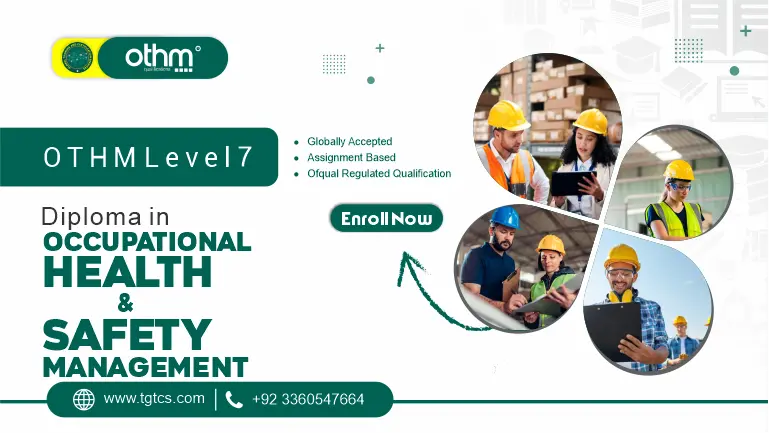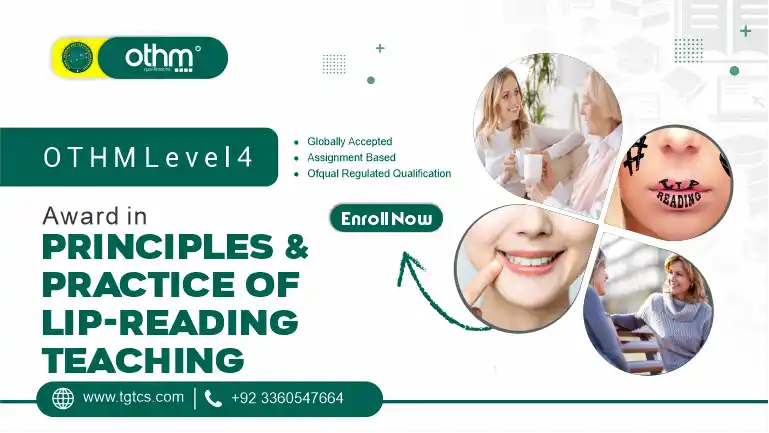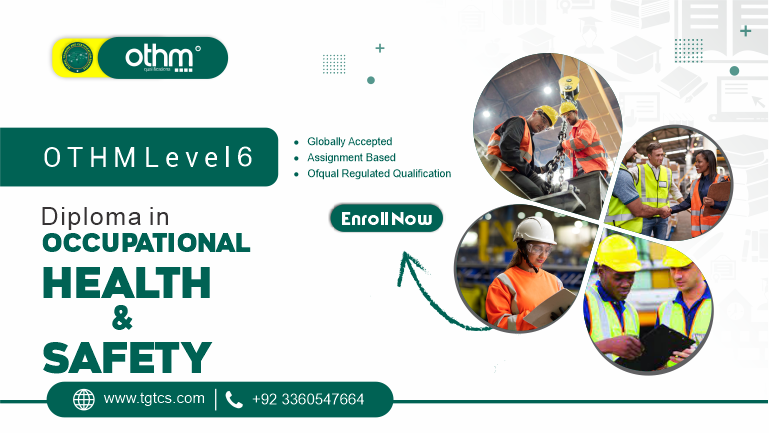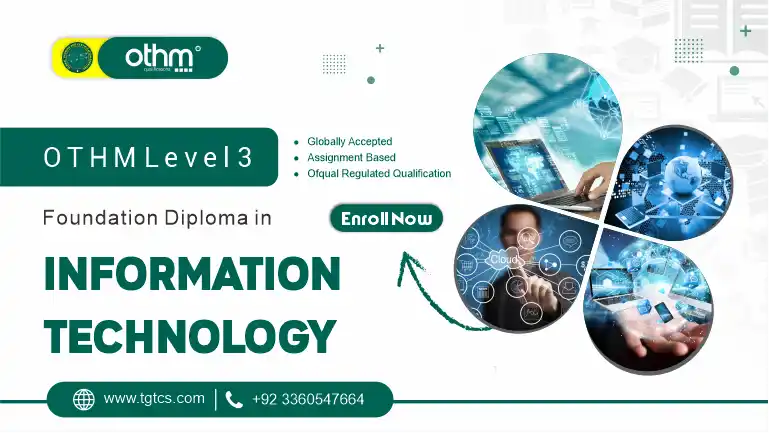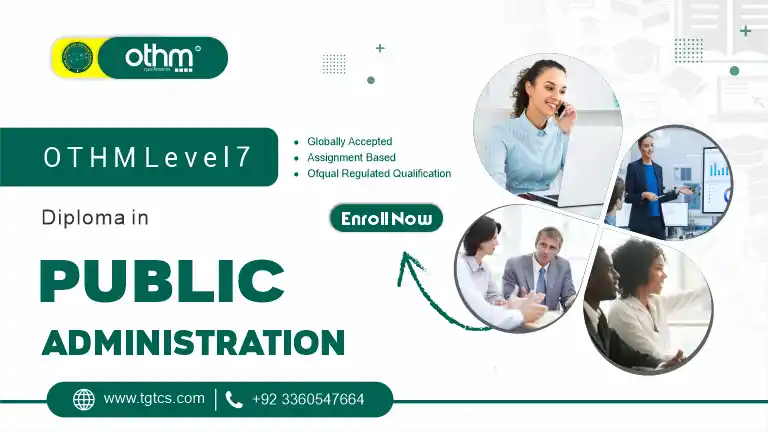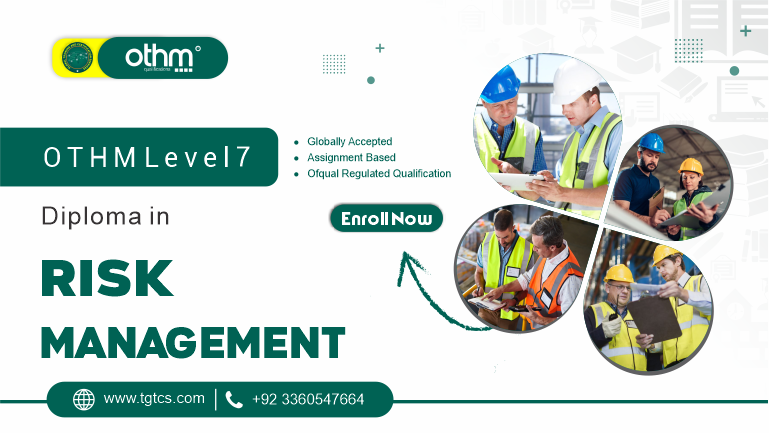OTHM Level 7 Diploma in Occupational Health and Safety Management
The OTHM Level 7 Diploma in Occupational Health and Safety Management is a comprehensive and advanced programme designed for professionals aiming to excel in workplace safety, risk management, and regulatory compliance. This Level 7 Occupational Health and Safety Diploma equips participants with the knowledge, practical skills, and leadership capabilities required to implement and manage effective health and safety systems across diverse industries.
Ideal for safety managers, compliance officers, auditors, and organizational leaders, this OTHM Level 7 Health and Safety Management Course covers advanced topics such as risk assessment, accident investigation, legislative compliance, safety culture development, and strategic management of occupational health and safety. Participants will gain the expertise to develop, monitor, and improve health and safety policies that align with international standards and best practices.
Delivered by experienced industry professionals, this programme combines theoretical learning with practical case studies, real-world scenarios, and interactive exercises. Graduates of the Advanced Occupational Health and Safety Management programme will be able to lead safety initiatives, manage organizational risks, and ensure compliance with legal and regulatory requirements, enhancing both organizational performance and employee well-being.
Upon successful completion, learners receive a globally recognized Level 7 OTHM Safety Management Diploma, opening career opportunities in health and safety consultancy, corporate risk management, regulatory bodies, and senior management roles. This course is ideal for professionals seeking to become recognized experts in occupational health and safety management.
Take the next step in your career with the OTHM Level 7 Diploma in Occupational Health and Safety Management and become a certified leader in workplace safety, risk control, and compliance excellence.
Ready to take the next step? Contact us now to learn more about our program and how you can get started on your journey towards a rewarding career in occupational health and safety management. Your future starts here!
The OTHM Level 7 Diploma in Occupational Health and Safety Management is an advanced qualification designed to equip professionals with the knowledge and skills necessary to effectively manage health and safety in the workplace. This diploma program delves deep into the principles, practices, and regulations surrounding occupational health and safety, providing learners with a comprehensive understanding of how to create and maintain a safe working environment for employees.
Before delving into the specifics of the OTHM Level 7 Diploma, let’s first recognize why occupational health and safety management is essential. Beyond legal requirements, fostering a safe and healthy work environment contributes to several key benefits for both employees and organizations. From reducing accidents and injuries to enhancing employee morale and productivity, effective OHS management is a cornerstone of sustainable business practices.
The OTHM Level 7 Diploma is a rigorous and comprehensive qualification that covers a wide range of topics relevant to OHS management. Participants can expect to delve into areas such as risk assessment, hazard identification, emergency preparedness, legislative compliance, and the implementation of robust OHS management systems. Through a blend of theoretical learning and practical application, students develop the skills and confidence needed to tackle real-world challenges in the field.
Upon successful completion of the program, graduates are equipped to take on leadership roles in occupational health and safety management, ensuring compliance with legal requirements, reducing workplace accidents and incidents, and safeguarding the well-being of employees. The OTHM Level 7 Diploma opens up a wide range of career opportunities in sectors such as construction, manufacturing, healthcare, and more, making it an invaluable credential for professionals seeking to advance their careers in occupational health and safety management.
key benefits of the OTHM Level 7 Diploma in Occupational Health and Safety Management:
1. Master Advanced Occupational Health and Safety Knowledge
- Understand international OHS standards, legislation, and ISO requirements.
- Learn risk assessment methodologies and accident investigation techniques.
- Develop strategies for hazard identification and control.
- Apply best practices to ensure workplace safety and sustainability.
- Gain knowledge of continuous improvement and safety culture development.
2. Enhance Career Opportunities and Professional Growth
- Qualify for senior health and safety management roles globally.
- Gain a globally recognised OTHM Level 7 certification.
- Open pathways to consultancy, regulatory, and corporate leadership positions.
- Increase employability and career progression prospects.
- Build a competitive edge in the occupational health and safety sector.
3. Develop Leadership Skills in OHS Management
- Lead and manage OHS teams effectively across industries.
- Allocate responsibilities and supervise team members based on expertise.
- Motivate staff to adopt and maintain strong safety practices.
- Resolve workplace safety conflicts efficiently.
- Evaluate team performance and implement corrective measures.
4. Practical Experience Through Case Studies and Exercises
- Apply theoretical knowledge to real-world OHS scenarios.
- Conduct audits, inspections, and workplace risk assessments.
- Analyse safety incidents and implement corrective actions.
- Improve decision-making and problem-solving skills.
- Build confidence in managing complex OHS challenges.
5. Ensure Compliance with Legal and Regulatory Standards
- Understand and implement national and international health and safety legislation.
- Conduct audits to identify compliance gaps and recommend improvements.
- Maintain accurate documentation and records for regulatory purposes.
- Support organisational compliance with ISO and local OHS standards.
- Promote a culture of accountability and safety excellence.
6. Promote Organisational Safety Culture
- Develop strategies to engage employees in proactive safety practices.
- Encourage ethical and responsible behaviour in workplace safety.
- Reduce workplace incidents through preventive initiatives.
- Integrate safety management systems into organisational processes.
- Enhance overall organisational reputation for safety excellence.
7. Strengthen Communication and Reporting Skills
- Prepare professional audit reports and safety documentation.
- Communicate findings and recommendations to management clearly.
- Present complex OHS concepts effectively to stakeholders.
- Improve collaboration across departments and teams.
- Support informed decision-making in organizational safety management.
8. Prepare for Professional Certification and Recognition
- Achieve readiness for OTHM Level 7 assessment and certification.
- Demonstrate competence in advanced health and safety management.
- Gain professional credibility in workplace safety leadership.
- Increase opportunities for international career growth.
- Position yourself as a recognised expert in occupational health and safety.
9. Support Continuous Personal and Professional Development
- Enhance critical thinking, analytical, and problem-solving skills.
- Build confidence in handling complex OHS responsibilities.
- Develop expertise highly valued by employers worldwide.
- Strengthen knowledge in managing organisational safety initiatives.
- Foster lifelong learning in occupational health and safety management.
10. Contribute to Organisational Efficiency and Sustainability
- Identify opportunities to improve workplace safety and efficiency.
- Reduce accidents, downtime, and associated costs.
- Implement sustainable practices for environmental and employee well-being.
- Enhance operational performance through effective safety management.
- Drive organisational excellence through proactive OHS strategies.
Here are the learning outcomes for each of the study units:
1. Health and Safety Management Practice
- Demonstrate advanced understanding of health and safety management principles in organisational contexts.
- Develop and implement effective workplace health and safety policies and procedures.
- Evaluate the roles and responsibilities of safety managers, employees, and regulatory bodies.
- Apply risk assessment and control techniques to minimise workplace hazards.
- Analyse the impact of organisational culture on health and safety performance.
- Integrate best practices to enhance employee engagement and safety compliance.
2. Effectiveness of Health and Safety Management Systems
- Assess the design and functionality of health and safety management systems (HSMS).
- Identify strengths, weaknesses, and opportunities for improvement in HSMS.
- Apply performance metrics to evaluate HSMS effectiveness.
- Analyse audit results to ensure compliance with legal and regulatory standards.
- Recommend strategies for continual improvement of organisational safety systems.
- Demonstrate knowledge of ISO standards and their application in HSMS.
3. Factors Affecting Risk and Strategic Risk Intervention
- Identify and analyse factors influencing workplace risk, including human, organisational, and environmental elements.
- Apply risk assessment methodologies to evaluate potential hazards.
- Develop strategic risk intervention plans aligned with organisational objectives.
- Integrate proactive risk management techniques to prevent incidents.
- Evaluate the effectiveness of risk control measures and mitigation strategies.
- Demonstrate critical thinking in prioritising and managing organisational risks.
4. Strategic Commitment to Health and Well-Being (20 credits)
- Understand the role of organisational leadership in promoting health and well-being.
- Develop strategies to foster a positive safety culture and employee engagement.
- Evaluate the impact of strategic decision-making on occupational health outcomes.
- Integrate health and well-being initiatives into organisational policies.
- Analyse case studies to understand the benefits of leadership commitment to safety.
- Advocate for organisational policies that support employee mental, physical, and social well-being.
5. Sustainability and Ethics in Health and Safety Practice
- Apply ethical principles to decision-making in occupational health and safety management.
- Analyse the role of sustainability in organisational health and safety policies.
- Evaluate the environmental, social, and economic impacts of OHS initiatives.
- Develop strategies for responsible and sustainable workplace practices.
- Demonstrate awareness of legal, ethical, and corporate social responsibility obligations.
- Promote ethical leadership in creating safe and sustainable working environments.
6. Advanced Research Methods
- Develop the ability to plan, conduct, and evaluate research in occupational health and safety.
- Apply qualitative and quantitative research methods to safety and risk management issues.
- Analyse and interpret data to support evidence-based decision-making.
- Evaluate academic literature and industry reports to inform organisational practice.
- Develop research proposals addressing critical health and safety challenges.
- Communicate research findings effectively to stakeholders and management.
The OTHM Level 7 Diploma in Occupational Health and Safety Management is ideal for individuals who aspire to pursue a career in occupational health and safety or seek to advance their existing career in this field. This course is well-suited for:
- Aspiring Professionals: Individuals who are new to the field of occupational health and safety and wish to gain the necessary skills and qualifications to enter the industry.
- Experienced Practitioners: Seasoned professionals already working in occupational health and safety roles who seek to enhance their knowledge, skills, and credentials for career advancement.
- Health and Safety Officers: Professionals responsible for overseeing health and safety practices within organizations, including safety officers, coordinators, or advisors.
- Human Resources (HR) Personnel: HR professionals interested in expanding their expertise to include health and safety management responsibilities within their organizations.
- Line Managers and Supervisors: Managers and supervisors who play a role in implementing health and safety policies and procedures within their teams or departments.
- Consultants and Auditors: Individuals working as health and safety consultants or auditors who aim to deepen their understanding of best practices and regulatory requirements in OHS management.
- Anyone Interested in Workplace Safety: Individuals passionate about promoting workplace safety and well-being, regardless of their current occupation or industry.
Overall, the course caters to a diverse range of individuals who share a common goal of ensuring the health, safety, and well-being of employees in the workplace. Whether you’re looking to start a new career, advance in your current role, or make a positive impact in your organization, the OTHM Level 7 Diploma provides the necessary foundation and skills to achieve your goals in occupational health and safety management.
Mandatory Unit
The OTHM Level 7 Diploma in Occupational Health and Safety Management consists of 6 mandatory units for a combined total of 120 credits, 1200 hours Total Qualification Time (TQT) and 600 Guided Learning Hours (GLH) for the completed qualification.
- Health and Safety Management Practice (20 credits)
- Effectiveness of Health and Safety Management Systems (20 credits)
- Factors Affecting Risk and Strategic Risk Intervention (20 credits)
- Strategic Commitment to Health and Well-Being (20 credits)
- Sustainability and Ethics in Health and Safety Practice (20 credits)
- Advanced Research Methods (20 credits)
Course Overview
Course Level
Level 7
Course Units
6 Mandatory Units
TQT
1200 hours
GLH
600 hours
Duration
6 to 12 Months
